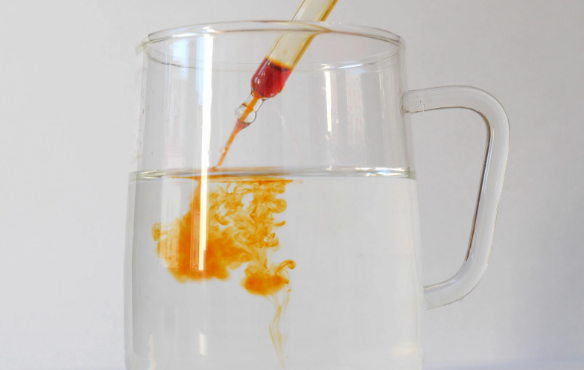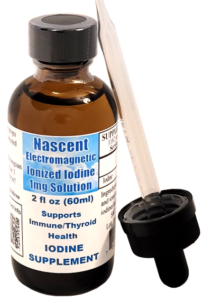Science-backed Uses and Health Benefits of Nascent Iodine
Certain metallic and nonmetallic elements are naturally found in human tissues. These trace minerals, while required in minute amounts, are extremely important to human health because they help drive biochemical reactions that allow cells, tissues and organs to thrive and function optimally.
The metallic trace mineral zinc catalyzes more than a hundred different enzymatic reactions. Iron and copper in their ionic forms also participate in redox reactions that facilitate energy metabolism.
Moreover, selenium, a nonmetallic trace mineral, is a major component of glutathione peroxidase, an antioxidant enzyme that protects against oxidative stress.
Because of their manifold functions inside the human body and their invaluable contributions to human health and wellness, you need to make sure that you get enough of these trace minerals from your daily diet. In spite of the fact that your body naturally contains these nutrients, it cannot manufacture all the nutrients necessary for your cells to thrive.
It is particularly important for vegans and some vegetarians to consume ample amounts of iodine in their diets. Iodine is one of the essential trace minerals that your diet should contain in ample amounts. These sources of iodine include fish, shrimp, and other seafood, dairy products like milk and cheese, and eggs.
A study conducted in 2022 by the U.S. Army Research Institute of Environmental Medicine (USARIEM) found that mild-to-moderate iodine deficiency is on the rise in the U.S. Despite salt-iodization policies being implemented, iodine deficiency and related disorders are also on the rise in European countries that lack such policies.
Iodine supplements provide an easy and reliable way to meet your daily iodine needs for people with limited dietary sources of iodine or those who prefer to use non-iodized salt. In addition to providing numerous health benefits, maintaining healthy iodine levels ensures that important cellular and bodily processes take place as well.
Iodine’s role in the human body
In addition to selenium, fluorine, phosphorus, sulfur, and chlorine, iodine is one of the few nonmetallic elements your body needs. Unlike most minerals, which tend to be widely distributed throughout the body, iodine is primarily concentrated in one place: the thyroid gland. According to research, healthy adults typically contain 15 to 20 milligrams (mg) of iodine, with 70 to 80 percent stored in the thyroid gland.
Iodine is essential for the production of thyroid hormones, so your thyroid gland contains most of it. When synthesizing the inactive hormone thyroxine (T4) and the active hormone triiodothyronine (T3), the thyroid gland normally uses 120 micrograms (mcg) of iodine.
Iodine deficiency affects both your thyroid and your whole body, since T3 and T4, which cannot be produced without iodine, regulate your body temperature, heart rate, blood pressure, hair, skin, and nails, as well as your hair, skin, and nails. [9] You also burn calories and use energy at a faster rate when these hormones are in your body, which means they have an enormous impact on your weight.
Iodine deficiency can cause goiter, which is an enlargement of the thyroid gland, which can cause difficulty swallowing and breathing and may even lead to choking.
In addition to causing fatigue, weight gain, and intolerance to cold, an iodine deficiency can also lead to hypothyroidism (underactive thyroid).
- There is confusion
- Hair that is coarse and thinning
- Hoarse or raspy voice (dysphonia)
- Fertility problems
- Skin that is puffy
- Skin that is scaly and dry
As an essential nutrient for normal growth and development, adequate iodine intake is also essential for humans. Iodine deficiency has been linked to stunted growth, impaired cognitive development, or intellectual disabilities in children, according to numerous studies. Pregnant women can also suffer from birth defects, miscarriages, and stillbirths if they have an iodine deficiency.
Aside from its role in thyroid hormone synthesis, iodine has been shown to neutralize free radicals and act as an antioxidant. According to a study in the International Journal of Molecular Sciences, iodine’s molecular form (I2) can protect the organs that absorb it from oxidative damage.
Italian researchers found, however, that iodine can also support your immune system in addition to its other benefits. A negative charge molecule known as hypoiodite can be made from dietary iodine by enzymes found in salivary cells and intestinal cells. This negatively charged molecule is believed to support healthy immune function.
Researchers recommend taking 1 to 3 mg of molecular iodine daily to reap these benefits.
Nascent iodine’s health benefits
In addition to potassium iodide and sodium iodide, nascent iodine and molecular iodine are also available as iodine supplements. In contrast to molecular iodine, nascent iodine is iodine in its atomic form, as opposed to potassium and sodium iodides, which are both salts of stable iodine.
By separating molecular iodine (I2), which contains two iodine atoms joined together, nascent iodine is obtained. Before being absorbed in the small intestine, dietary iodine first converts into iodide ions (I-). In comparison to other iodine supplements, nascent iodine has an advantage because it comes in this absorbable form.
The following benefits can be obtained from maintaining healthy levels of iodine through proper diet and supplementation:
As mentioned earlier, iodine in the form of hypoiodite has beneficial properties that can help the body fight off disease. According to a recent study published in Frontiers in Immunology, iodide can support healthy immune responses by influencing the activity of various immune cells positively.
The thyroid gland relies on iodine to produce hormones that regulate metabolism and support the proper functioning of different organs. Adequate daily intake of iodine is crucial for maintaining thyroid health, as both excessive and insufficient amounts can result in thyroid disease. While the majority of iodine in the body is located in the thyroid gland, there are also nonhormonal sources present in other tissues like the eyes, mammary glands, cervix, gastric mucosa, and salivary glands.
Iodine is a vital nutrient for maintaining healthy brain function throughout life, but it is especially important during pregnancy, infancy, and early childhood. This is because thyroid hormones play a crucial role in the growth and development of the brain. Research has shown that inadequate iodine intake in pregnant women can hinder the neurological development of the fetus, and in children, it has been linked to below-average IQ levels. A study published in Critical Reviews in Food Science and Nutrition points out that this connection may be due to the impact of iodine deficiency on important brain chemicals and various regions of the brain responsible for learning and memory, such as the hippocampus.
One key aspect of maintaining optimal health is ensuring a healthy metabolism. The hormones T3 and T4, produced by the thyroid gland, play a vital role in regulating this process. Simply put, metabolism involves the conversion of food into energy for your body’s cells. However, if your iodine intake falls short, the production of these essential hormones will be hindered, leading to sluggish metabolism and low energy levels – both common indicators of an underactive thyroid. By meeting your daily iodine needs, you can support your thyroid’s proper functioning and promote a healthy metabolism.
Supports healthy skin, teeth and hair – An imbalance of thyroid hormones due to iodine deficiency can lead to hair loss. During the same time, it may also lead to dry, flaky skin, as iodine is essential for normal skin health. Iodine deficiency can also cause dental problems, according to experts. To maintain healthy skin, teeth and hair, you must ensure you get enough iodine every day to maintain optimal thyroid hormone levels.
Iodine contributes to a healthy metabolism, so poor iodine intake can adversely affect your energy levels. You can easily rectify this by following a healthy diet and supplementing with nascent iodine. Since nascent iodine is easily absorbed in the intestine, it can help you maintain healthy thyroid hormone levels that are already within the normal range while supporting healthy energy levels.
During nuclear emergencies, your thyroid gland has the ability to store iodine. This means that in the event of a nuclear disaster, you can safeguard yourself from radioactive iodine found in nuclear fallout by consuming nascent iodine. The concept behind this is that by saturating your thyroid with nonradioactive iodine, you can prevent it from storing radioactive iodine, which has been linked to thyroid cancer, particularly in children. It’s important to keep in mind that your thyroid can only hold onto iodine for a limited time. Thus, for maximum protection from nascent iodine, it’s best to take it before or during contact with radioactive iodine. Keep in mind that while supplements like nascent iodine are helpful in guarding against radioactive iodine, they cannot protect against other forms of radiation exposure.
A source of high-quality, lab-verified Nascent Iodine
In order to maintain optimal health, iodine is an essential trace mineral, but it is needed only in small amounts. The benefits of maintaining a healthy level of this essential trace mineral include supporting optimal brain, immune, and thyroid function, as well as protecting against radioactive iodine from nuclear fallout.
Nascent Iodine is a lab-verified liquid dietary supplement that has been specially formulated for optimal absorption for those looking for clean, high-quality, non-China and non-GMO iodine supplements.
Using Edgar Cayce’s divinely inspired method of adding energy to separate diatomic iodine into monoatomic nascent iodine, nascent iodine is formed from diatomic iodine. To give this 2% strength stable iodine tincture a tremendous shelf life, it uses pure, USP-grade ethanol distilled from fermented grain instead of glycerin.
Among all the iodine products we have tested, Nascent Iodine has one of the lowest surface tensions. The low surface tension of nascent iodine makes it easy for your body to absorb it. To use, add 1 to 3 drops to 1 12 ounces of water. Take twice daily on an empty stomach to receive 350 mcg of elemental iodine.
In the same way, Nascent Iodine provides high-quality iodine to support your thyroid, energy levels, and even your natural ability to eliminate toxins. Take three drops in purified water and swallow. Use once daily or according to your health care provider’s recommendations.
The purity, potency, and safety of Nascent Iodine have been rigorously tested for glyphosate, heavy metals, and microbiology.
With easy-to-absorb nascent iodine, you can support healthy thyroid function and hormone levels.
There has been no evaluation by the FDA of these statements. This product is not intended to diagnose, treat, or cure any disease.

